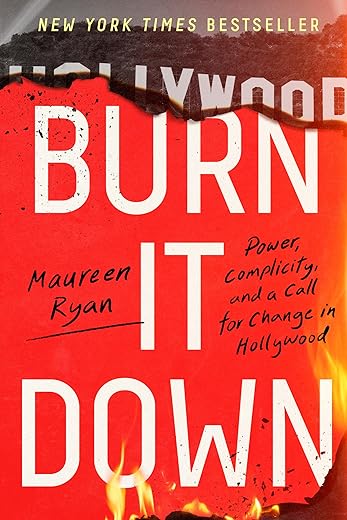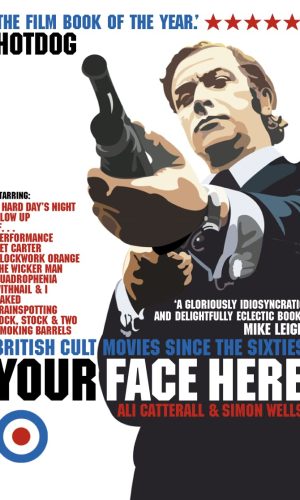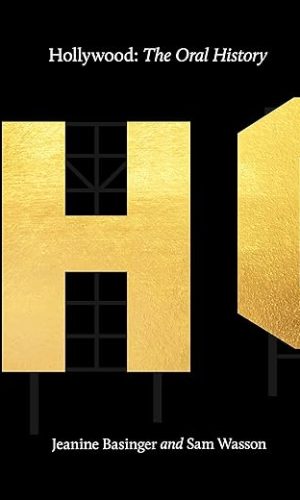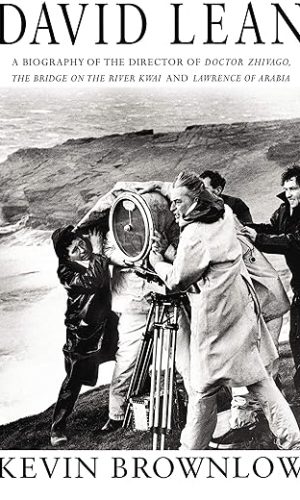Burn It Down: Power, Complicity, and a Call for Change in Hollywood
£16.50£23.80 (-31%)
NEW YORK TIMES BESTSELLER • LOS ANGELES TIMES BESTSELLER
In this spectacular, newsmaking exposé that has the entertainment industry abuzz and on its heels, Vanity Fair’s Maureen Ryan blows the lid off patterns of harassment and bias in Hollywood, the grassroots reforms under way, and the labor and activist revolutions that recent scandals have ignited.
It is never just One Bad Man.
Abuse and exploitation of workers is baked into the very foundations of the entertainment industry. To break the cycle and make change that sticks, it’s important to stop looking at headline-making stories as individual events. Instead, one must look closely at the bigger picture, to see how abusers are created, fed, rewarded, allowed to persist, and, with the right tools, how they can be excised.
In Burn It Down, veteran reporter Maureen Ryan does just that. She draws on decades of experience to connect the dots and illuminate the deeper forces sustaining Hollywood’s corrosive culture. Fresh reporting sheds light on problematic situations at companies like Lucasfilm and shows like Lost, Saturday Night Live, The Goldbergs, Sleepy Hollow, Curb Your Enthusiasm and more.
Interviews with actors and famous creatives like Evan Rachel Wood, Harold Perrineau, Damon Lindelof, and Orlando Jones abound. Ryan dismantles, one by one, the myths that the entertainment industry promotes about itself, which have allowed abusers to thrive and the industry to avoid accountability—myths about Hollywood as a meritocracy, what it takes to be creative, the value of human dignity, and more.
Weaving together insights from industry insiders, historical context, and pop-culture analysis, Burn It Down paints a groundbreaking and urgently necessary portrait of what’s gone wrong in the entertainment world—and how we can fix it.
Read more
Additional information
| Publisher | Mariner Books (6 July 2023) |
|---|---|
| Language | English |
| Hardcover | 400 pages |
| ISBN-10 | 0063269279 |
| ISBN-13 | 978-0063269279 |
| Dimensions | 15.24 x 2.92 x 22.86 cm |










by MultiWonder29
I have such mixed feelings about Burn It Down. On the one hand, the issues it’s trying to raise and the myths it tries to dispel, are worthy targets. And Ryan does a good job of stripping away your rose-tinted glasses. Hollywood, at least by Ryan’s account, is as every bit as miserable and tortuous as you might have ever feared (at least, if you’re not on top, calling the shots).
In many ways it’s brilliant to see the lid blown off this industry that many of us love so much, but for me the author gets in the way of her aims.
For a start, Ryan places herself at the centre of EVERYTHING. She has to pass judgement and opinion over every tiny thing she mentions, refusing to allow her audience to make up their own minds about anything, or even for the stories to tell themselves.
Often there are references to “harrowing” tales… but they’re left out of the book, and their alleged existence is used as evidence that we’re supposed to take at face value. I’m sure there’s truth to that claim, but it undercuts the central narrative when the apparently “worst” stories are left out.
The more I read, the more I realised this is Ryan’s personal take, not an attempt at an unbiased piece of journalism. In many ways feels like an extended blogpost, with all of the lack of self-awareness that such a medium can bring.
For example, she frequently gives herself a pass for falling prey to shilling Hollywood’s myths during her many years as showbiz journalist, but now she has zero sympathy for anyone who isn’t as enlightened as her. She mercilessly lambasts anyone who says the things she used to say without any sense of self-awareness: She openly admits she was once just like them… but now everyone else is labelled “awful”.
And where was the editor? As others have pointed out, the excerpts in Vanity Fair were tight and readable… but the finished book is overly verbose. Frequently what could have been said in a paragraph is spread over two pages. The same points are often repeated from different angles. Which isn’t to say Ryan isn’t eloquent or coherent. She absolutely is. But her insistence on verboseness and commentary keeps us at the periphery a lot of the time: People’s stories often aren’t shared in detail, instead we see snippets of them, and Ryan comments on them, telling us how to feel and think.
It feels like 50% hard evidence and 50% commentary. I don’t think I’ve ever read a non-fiction book that placed its author so front and centre to everyone else’s story. And there’s a whiff of Jordon Peterson-style “I’ve figured out something important, and you all must listen to me! I have the solution!” self-importance throughout.
The way she ends her opening chapter is indicative of the importance she places on her own voice:
‘The day before I interviewed Wood, I had lunch with two established writer/producers. Both are people of color. As we consumed an impressive number of coffees, one of them observed that the industry was notably different than it had been in the ’90s, when he started out.
‘”True,” I answered. “But back then, the bar was set in hell.”
‘Neither disagreed.’
For a book that wants to give a voice to the downtrodden, it’s somewhat maddening that Ryan has to insert herself at every opportunity.
It’s especially maddening because I wanted to desperately hear those stories. Sometimes we do, to be fair, but takes a long time to get there, and even then I just wish Ryan would get out of the way.
Also, forget about shades of grey or counterpoints.
A brief example, later on in the book she throws HBO under the bus for featuring nudity in its shows. There’s definitely something worth exploring there, as it has often felt like there’s been a nudity quota per episode that needs to be hit, but her account doesn’t pause to consider the other side: American TV is stymied by conservatism. Guns, violence and gore… they are fine for primetime TV. It doesn’t matter if children see them… but a naked human form, a swear word, an allusion to adult themes… they must be removed at all costs!
HBO addressed this puritanical trend, filling a gap for adult audiences because adult themes simply weren’t available elsewhere in US culture. Did they cross the bar sometimes? Almost definitely, but there’s more to be said than just taking a few quotes out of context to support a wider narrative. And plenty of their most acclaimed shows featured no nudity at all.
Ryan simply skates by, taking pot-shots and not bothering to stop to check if any of them landed, and its indicative of what’s really going on here: This is her take, her manifesto, and her anger spilling onto the pages. Everything is angels and demons, black and white. There’s no room for nuance while she excises her stress migraines, and certainly no counterpoints.
And if there’s no counterpoints, then how do we know how accurate her portrayal is? The one-sided, opinion-driven style of the writing sometimes defangs its central arguments.
Does this mean Burn It Down is without value? Absolutely not. This is a book that you won’t forget. It opens the window and lets you peer inside Hollywood, exposing its hypocrisies, corruption, and abuses. It’s absolutely worth your time and worth reading… but it is a slog.
by Clipper
This is a well written and considered dissection of the inherent issues of the power dynamics in Hollywood, and the film and TV industry in general. Examining nepotism, abuse of position and structural discrimination it’s a must read for those who want to understand why TV is the way it is. While personally I think a larger examination of the shifting economic factors would have been helpful, particularly in addressing the issues with access to the industry, I was deeply impressed by the detail, research and examinations that went into the creation of this piece.
by Andy
I came with an open mind but after suffering through this at least 10 times too long diatribe I just felt sorry for the author.
Poorly written, keeps calling people survivors which I found distasteful, believes every one with a beef without question and discounts and belittles anyone’s who might have been in charge.
I note not a single mention of Ms Kennedy when talking about Star Wars.
I’m sure there are many distasteful people in the business but other than the Damon from the Lost chapter there was little attempt to get any redress.
Ends with statements like “perpetrators of harm” and “harm doers”.
Good grief, speak English.
I was disappointed. There is a good article in this overlong essay.